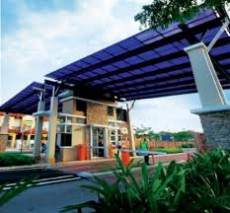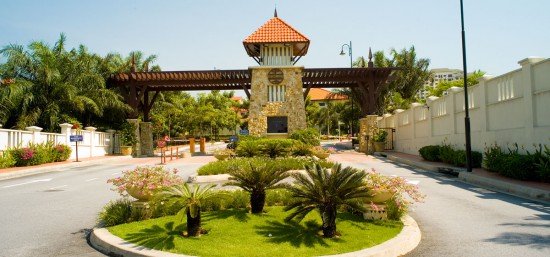Besides the features mentioned in Part 1, residents and buyers should also take note of these aspects for residential properties:
Gated and guarded
Apartments, condominiums and most housing areas these days claim to be ‘gated and guarded’, complete with a guard house to monitor people going in and out. However, how effective exactly are these guard houses? ‘Good’ guard houses are properly built, solid structures that can protect the guards and have boom gates that allow entry only to authorised people and vehicles. However, guard houses seen in most housing areas are just simple wooden or brick structures with a manual barrier, which is not effective in barring outsiders from entering.
For developments with a perimeter wall, the walls should be high enough to deter intruders from scaling them to enter. Perimeter walls should be at least 7 feet tall, with 8 feet walls being the optimal height as they are not easily scaled.
Housing/Condominium security
Most, if not all, high-rise buildings now offer 24-hour security with guard patrols and CCTV, but these should also include card-only access to lifts in order to prevent unauthorised people from entering. Some gated and guarded communities also require residents to have an access card to enter and leave, while visitors have to register before allowed entry. This is useful for keeping records of vehicle registration numbers and individual faces, which can be monitored via CCTV.
 CCTV vs alarm system
CCTV vs alarm system
Speaking of CCTV systems, they are usually limited to the main entrance of condominiums or housing areas. Individual units or houses do not have their own security and monitoring system, therefore installing a CCTV or alarm system in your home is ideal to monitor suspicious activity and prevent crime. For landed properties, installing a security system should not be a problem, but what about condominium units? Some condominium managements do not allow installation of such systems, while many will be concerned about the high cost and maintenance fees. However, there are now wireless smart-home security systems that are affordable, easily set-up and connected to mobile devices and multiple family members.
Barbed wire vs sharp spikes
Take a look at landed houses in Malaysia, and you’ll find that many will have sharp spikes atop their gates, fences and even walls. Barbed wire, on the other hand, are less common. These are meant to keep out burglars, but do the spikes really help to prevent break-ins?
The video below shows how easily burglars can climb up through spiked fences and stand in between them. Barbed wires are a better choice as they are soft (no grip or handhold) and prevent people from standing on the top of the wall.
Personal safety habits
Prevention is better than cure, and there’s no better way than starting right at home. Always lock your doors, windows and grilles when going out. Burglars and thieves have ways to easily break in through windows and grilles, regardless of whether they are locked or not, but a locked door, window or grille is definitely much harder to pry open than an open one. Plus, the extra seconds the burglar spends on breaking into a locked house could give you precious time to arrive home to prevent a burglary, or for the police to arrive.
Community (rukun tetangga)
The strength and unity of the local community is also an important factor in preventing crime. Getting to know your neighbours is a good way to ensure safety and prevent crime from happening (as seen in the video from KickOut Malaysia below). Inform your neighbours if you will be away from home for an extended period of time, so that they can help keep an eye on your house and help you collect mail. Being on good terms with your neighbours also helps, so that they will know something is wrong when “movers” show up at your house in a lorry and cart all your things away while you’re supposed to be on a vacation to Bali. True story.
Proximity to emergency departments
As mentioned in Part 1, proximity to emergency departments such as a police station, hospital and fire station is important in case of emergencies. You want help to arrive as soon as possible, so it is vital to note distance from the nearest emergency department.
Pro tip(s):
- Save the PDRM hotline in your phone contact list, and label it so that it is the first number that shows up (e.g. AAAA PDRM Hotline). +603-222 66 3333
- Besides that, it is also a good idea to Google up and save the number of the police station nearest to your house, so that you can directly contact them during emergencies instead of going through the emergency 999 hotline. This will save quite a lot of time, and could prevent a crime or even save a life.
Want more personal and property safety tips? Check out more articles from Estate123 Insight! 🙂






![Recreational Parks in Petaling Jaya: Central Park Bandar Utama [Video]](https://insight.estate123.com/wp-content/uploads/2022/10/Bandar-Utama-Central-Park-Thumbnail-440x264.jpg)